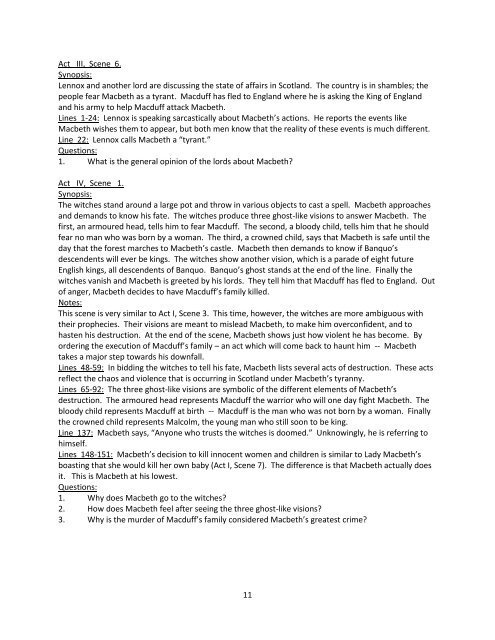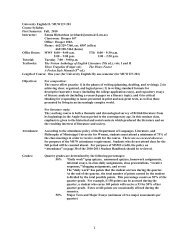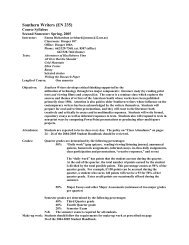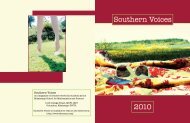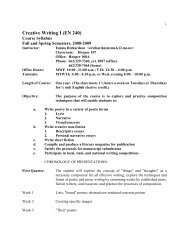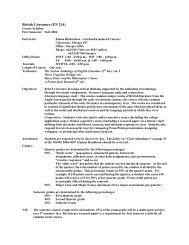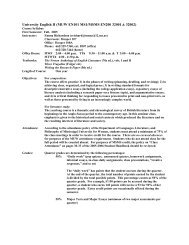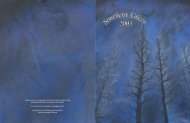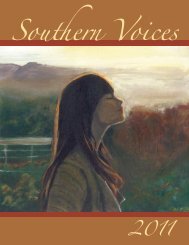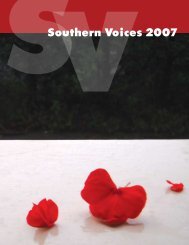1 Macbeth Study Guide (prepared by student teacher Alan Newton ...
1 Macbeth Study Guide (prepared by student teacher Alan Newton ...
1 Macbeth Study Guide (prepared by student teacher Alan Newton ...
Create successful ePaper yourself
Turn your PDF publications into a flip-book with our unique Google optimized e-Paper software.
Act III, Scene 6.Synopsis:Lennox and another lord are discussing the state of affairs in Scotland. The country is in shambles; thepeople fear <strong>Macbeth</strong> as a tyrant. Macduff has fled to England where he is asking the King of Englandand his army to help Macduff attack <strong>Macbeth</strong>.Lines 1-24: Lennox is speaking sarcastically about <strong>Macbeth</strong>’s actions. He reports the events like<strong>Macbeth</strong> wishes them to appear, but both men know that the reality of these events is much different.Line 22: Lennox calls <strong>Macbeth</strong> a “tyrant.”Questions:1. What is the general opinion of the lords about <strong>Macbeth</strong>?Act IV, Scene 1.Synopsis:The witches stand around a large pot and throw in various objects to cast a spell. <strong>Macbeth</strong> approachesand demands to know his fate. The witches produce three ghost-like visions to answer <strong>Macbeth</strong>. Thefirst, an armoured head, tells him to fear Macduff. The second, a bloody child, tells him that he shouldfear no man who was born <strong>by</strong> a woman. The third, a crowned child, says that <strong>Macbeth</strong> is safe until theday that the forest marches to <strong>Macbeth</strong>’s castle. <strong>Macbeth</strong> then demands to know if Banquo’sdescendents will ever be kings. The witches show another vision, which is a parade of eight futureEnglish kings, all descendents of Banquo. Banquo’s ghost stands at the end of the line. Finally thewitches vanish and <strong>Macbeth</strong> is greeted <strong>by</strong> his lords. They tell him that Macduff has fled to England. Outof anger, <strong>Macbeth</strong> decides to have Macduff’s family killed.Notes:This scene is very similar to Act I, Scene 3. This time, however, the witches are more ambiguous withtheir prophecies. Their visions are meant to mislead <strong>Macbeth</strong>, to make him overconfident, and tohasten his destruction. At the end of the scene, <strong>Macbeth</strong> shows just how violent he has become. Byordering the execution of Macduff’s family – an act which will come back to haunt him -- <strong>Macbeth</strong>takes a major step towards his downfall.Lines 48-59: In bidding the witches to tell his fate, <strong>Macbeth</strong> lists several acts of destruction. These actsreflect the chaos and violence that is occurring in Scotland under <strong>Macbeth</strong>’s tyranny.Lines 65-92: The three ghost-like visions are symbolic of the different elements of <strong>Macbeth</strong>’sdestruction. The armoured head represents Macduff the warrior who will one day fight <strong>Macbeth</strong>. Thebloody child represents Macduff at birth -- Macduff is the man who was not born <strong>by</strong> a woman. Finallythe crowned child represents Malcolm, the young man who still soon to be king.Line 137: <strong>Macbeth</strong> says, “Anyone who trusts the witches is doomed.” Unknowingly, he is referring tohimself.Lines 148-151: <strong>Macbeth</strong>’s decision to kill innocent women and children is similar to Lady <strong>Macbeth</strong>’sboasting that she would kill her own ba<strong>by</strong> (Act I, Scene 7). The difference is that <strong>Macbeth</strong> actually doesit. This is <strong>Macbeth</strong> at his lowest.Questions:1. Why does <strong>Macbeth</strong> go to the witches?2. How does <strong>Macbeth</strong> feel after seeing the three ghost-like visions?3. Why is the murder of Macduff’s family considered <strong>Macbeth</strong>’s greatest crime?11


